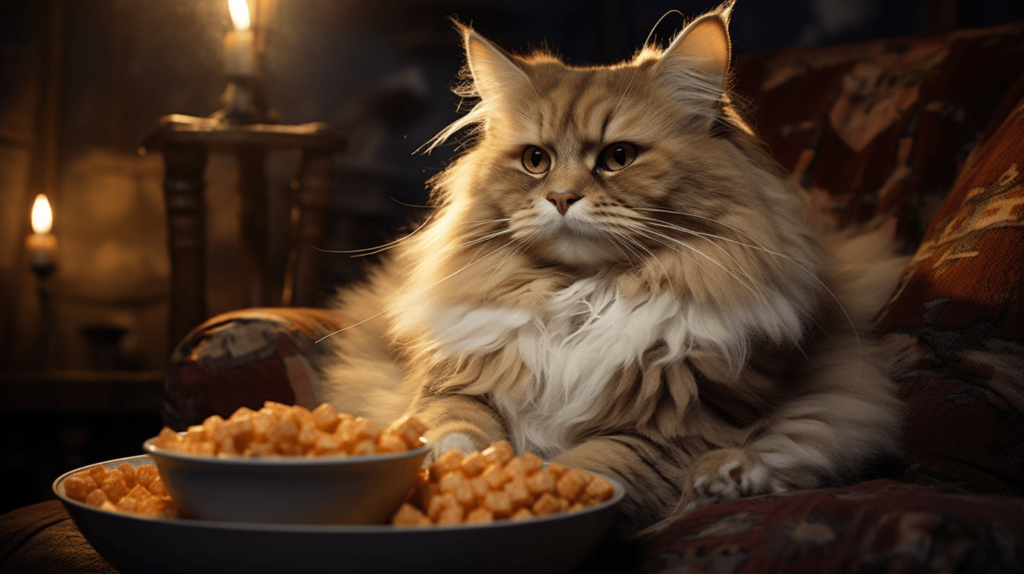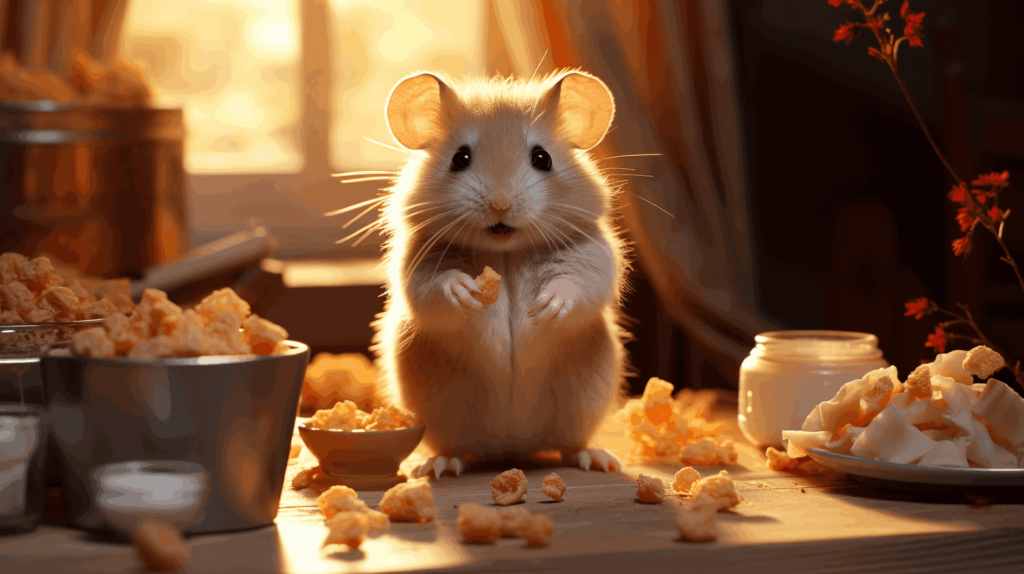Just like a bowl of popcorn can captivate our attention during a movie, the question of whether cats can safely consume this popular snack has piqued the curiosity of pet owners. While seemingly harmless, there are important considerations to keep in mind.
In this article, we will delve into the potential risks and dangers of feeding popcorn to cats and explore alternative treats that may better suit their dietary needs. So, let’s unravel the truth behind cats and popcorn.
Key Takeaways
- Cats can safely eat air-popped popcorn but should be checked for visible blockages.
- Cats should only be given air-popped popcorn without butter, salt, or other additives.
- Popcorn can pose risks to cats, including choking hazards, digestive tract blockage, and toxic toppings.
- Providing cats with safer alternatives, such as commercial cat treats, is recommended to meet their nutritional needs.
Health Benefits of Feeding Cats Popcorn
Although popcorn may provide some fiber to a cat’s diet, no significant health benefits are associated with feeding cats popcorn. While fiber is essential for a cat’s digestive health, they can obtain it from their regular cat food or other food specifically formulated for their nutritional needs.
Additionally, cats have different dietary requirements than humans, and their digestive systems are not designed to process certain ingredients commonly found in popcorn, such as butter, salt, and seasonings. Feeding cats popcorn with these additives can lead to digestive issues, organ damage, and even poisoning.
Therefore, it is best to avoid giving cats popcorn as a treat and instead opt for safe, cat-friendly snacks that provide the necessary nutrients for their overall well-being.
Risks and Dangers of Popcorn for Cats
When considering the risks and dangers of feeding popcorn to cats, it is essential to be aware of the potential choking hazards and digestive tract blockages that can occur if cats consume unpopped kernels or popcorn with toxic toppings.
Here are five important points to keep in mind:
- Cats can safely eat air-popped popcorn but should be checked for visible blockages.
- Cats may need help if popcorn is stuck in their mouth or throat.
- Give your cat only air-popped popcorn, as ready-made bags may contain chemicals and unhealthy additives.
- Break the popcorn into smaller pieces to make chewing easier for your cat.
- Avoid giving your cat popcorn that is buttered or seasoned with salt or other additives.
Signs of Popcorn Allergies in Cats
The signs of popcorn allergies in cats can vary, but cat owners need to be vigilant and observe their feline companion’s behavior closely. Allergies to popcorn in cats can manifest in various ways, including skin irritations, itching, sneezing, coughing, vomiting, diarrhea, and difficulty breathing. These symptoms may occur immediately after popcorn or develop over time with repeated exposure.
It is crucial to note that some cats may be sensitive or intolerant to certain ingredients commonly found in popcorn, such as butter, salt, or artificial flavorings. If any signs of an allergic reaction are observed, it is recommended to consult a veterinarian for proper diagnosis and treatment.
Generally, it is best to avoid feeding popcorn to cats and opt for cat-friendly treats that meet their nutritional needs.
How to Safely Feed Popcorn to Cats
An important consideration when feeding popcorn to cats is to ensure the popcorn is fully popped and free of any potential choking hazards. Cats can safely eat air-popped popcorn but should be checked for visible blockages. Swallowing popcorn without any issues is a good sign. Choking hazards should be avoided; cats may need help if popcorn is stuck in their mouth or throat. Give your cat only air-popped popcorn, as ready-made bags may contain chemicals and unhealthy additives.
Typical Popcorn Toppings to Avoid for Cats
Importantly, cats should always avoid popcorn toppings that contain salt, butter, caramel, garlic, spices, or cheese, as they can be harmful to their health. These ingredients can cause various issues, such as poisoning, organ damage, allergies, stomach problems, and cat weight gain.
Salt, in particular, can lead to sodium poisoning and other health complications. When consumed in excess, butter can contribute to cholesterol problems and weight gain. Caramel may contain xylitol, a substance that is toxic to cats and can be fatal. Garlic and spices can cause organ damage or failure, while cheese can lead to digestive issues.
It is crucial to prioritize your cat’s health and choose treats that meet their nutritional needs, avoiding harmful toppings when feeding them popcorn.
Alternatives to Popcorn for Cats’ Snacks
Consider exploring cat-friendly snacks like freeze-dried chicken or tuna as alternatives to popcorn for your feline companions. While popcorn may seem tempting to share with your cat during movie nights, it is essential to be aware of its potential risks and dangers to their health. Instead, here are some alternatives that can provide a safe and enjoyable snacking experience for your cat:
- Freeze-dried chicken: Cats enjoy freeze-dried chicken’s crunchy texture and meaty flavor.
- Tuna: Canned or fresh, can be a tasty and protein-rich cat snack.
- Cat treats: Look for commercially available cat treats formulated to meet a cat’s nutritional needs.
- Homemade treats: Make homemade treats using cat-safe ingredients such as cooked chicken or fish.
- Catnip-infused treats: Catnip-infused treats can provide cats with a stimulating and enjoyable snacking experience.
Consult a veterinarian to ensure your snacks are safe and suitable for your cat’s dietary requirements.
Conclusion
In conclusion, while popcorn may seem like a tempting treat for our feline friends, the potential risks and dangers outweigh any potential health benefits. Cats are obligate carnivores with specific dietary needs best met with appropriate cat food.
Feeding popcorn to cats can lead to digestive issues, choking hazards, and exposure to harmful additives. Sticking to cat-friendly snacks and treats specifically formulated to meet their nutritional requirements is best.
Let’s keep our cats safe and satisfied with the right snacks for their well-being.



